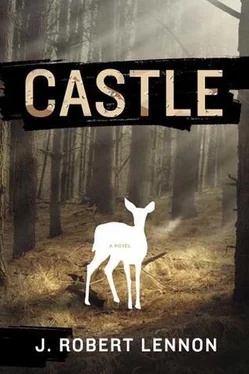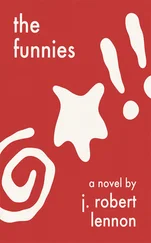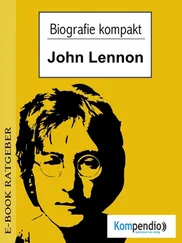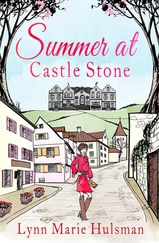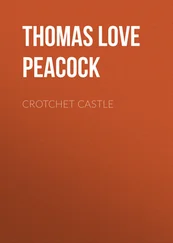The Doctor was not a good-looking man. Of course I would not have understood this at the time — I was a child, and had rarely had the opportunity to look closely at anyone, let alone a grown man who wasn’t my father. But his face was distinctive, severe, the cheeks and eyes sunken, the bones sturdy and ghoulishly pronounced. The muscles of his jaw were twitching in the ember-light, as if he were dreaming of something frightening. His neck was long, and rough with beard stubble, and his Adam’s apple, the largest I have ever seen, moved up and down with haunted slowness, like a will-o’-the-wisp.
I became fixated on that Adam’s apple, and the neck that contained it, the tendons taut and long, the throat a dark depression between them, the blood pulsing in the vein. And when my hands moved toward it, it was as though they were someone else’s, and I a passive observer. They were curled like claws, these hands, and crusted over with earth, the fingernails long and filthy, the creases and pores standing out in sharp relief. They were like the hands of an old man, wizened but still strong, and I understood that they meant to murder Doctor Avery Stiles, to choke him in his sleep.
They had that power, I knew. He would struggle, but I would not let go. I would press the life from him, crush his throat, cut off the blood to his brain. (I knew about these things from comic books and films — or thought I knew, as, in retrospect, I am certain I could not possibly have killed Doctor Stiles.) My hands drew closer and closer, and then, when they were about to make contact with his rough flesh, they stopped.
His eyes were open. They were darting back and forth as though following some mad insect as it flew around the room. It took several seconds before I realized that he was still asleep.
Before I could relax, however, his head turned, and those eyes appeared to stare at me, and his face softened, and the eyes went limpid and sad, and tears ran down his cheeks.
“Rachel,” he whispered.
I did not, could not, speak.
“Rachel…” His hands came up, out of the blanket, and found my cheeks; he stroked them, gently, as he cried.
I could stand it no longer; I backed away, disgusted with myself and with his touch. Confusion crumpled his face, and he looked as if he might sob; but instead his eyes fluttered and closed, and his breaths quieted, and lengthened.
I gathered my things and retreated up the stairs. Outside the compound, a rain barrel stood underneath a crude gutter made from a hollowed-out log; I dipped my cupped hands into it and splashed my face with water. Then I put my clothes on, found a suitable flagstone, and curled up there to sleep.
As it happened, Doctor Stiles had made prior arrangements with my parents, or at least my father, for me to stay overnight. From his questions the next day, I gathered that my father had been told I would be learning to make camp, build a fire, and cook my dinner and breakfast. In fact, I had barely slept, had made no camp, and had eaten nothing since he dropped me off the day before. He seemed to sense that there was something wrong, or at least something peculiar — he stole glances at me as he drove, and at one point seemed almost on the verge of speaking. But he didn’t, and we arrived home without any understanding having been reached.
My mother, on the other hand, was more direct, and took me into her arms with desperate relief, studying me as though I had been gone a year: my face, my hands, my arms and hair.
“What happened to you?” she demanded. “What did he do to you?”
I wasn’t certain how to answer. Something about her eyes, their penetrating anger and love, seemed crazy to me. Or more likely, as I was only eleven, I was merely disoriented and frightened. In any event, I had never seen her in this state. She wore her bathrobe, though it was past noon, and her hair, usually tied back into a casual, efficient ponytail or bun at this hour, was sticking out in all directions, as if from an electric charge. She smelled unclean, and her chest heaved with shallow, quick breaths.
“Nothing, Mother,” I said.
“What, then!” she said. “What did you do, all night?”
“We went camping.”
“Are you hurt? Are you all right?”
“I’m fine, Mother.”
She embraced me tighter then, and took me by the shoulders and held me at arms’ length, observing, analyzing. Slowly her desperation receded, only to be supplanted by skepticism and, soon, disappointment.
“You’re not telling me the truth, are you, Eric?” she asked me.
“Yes, I am.”
She frowned, releasing me from her grasp.
“All right, Eric. All right.” She stood up from the chair she had fallen into to study me. “I’m glad you’re home.”
“I’m glad to be home, Mother.”
She had begun to walk away, but now she stopped and, looking over her shoulder, leveled a pained, unhappy gaze at me. She opened her mouth to speak, but, like my father on the ride home, she never did. Instead, she tightened her robe around her waist and climbed the stairs to the bedroom. I watched until she was out of sight.
When I turned, my father was standing by the fireplace gazing at me, an expression of stern approval on his face. And for a moment, I felt great pride at my ability to lie to my mother, and a mixture of pity and condescension for her, for having accepted my lies. I felt respected, and strong. I felt like a man.
I fell in and out of consciousness, only intermittently aware of where I was, or what was happening. My eyes were fixated on a black spot somewhere in the distance, around which something, some lesser darkness, flowed. I strained in the dim silver light to see the spot more clearly, and as I came to, it resolved itself into a knot in a broad plank, the lines of current around it no more than the grain of the wood. I blinked. My senses returned, slowly. Deep aches uncurled in my shoulders and knees, and I was cold. I remembered now where I was: suspended in a wooden cage, my limbs bound by rusted iron shackles and chains. I couldn’t feel my hands or feet. The rank scent of my unwashed body was sharp in my nose, and my mouth was dry and sticky and tasted of mud.
As I endured this moment of vulnerability, the courtyard began to fill up with memories: the tests of balance and concentration I faced on the tipping board; the feats of agility and strength I was asked to perform; the marathon sessions of stillness and stealth, such as the time I was made to perch in a tree for six hours without moving, or hide in a dark room all day, or hang from a branch, or crouch in the brush. I remembered now the Doctor’s strange demand that I give up my possessions, the things I valued the most: my G.I. Joe, and mushroom book, and canteen. The treasure map. The toy train he himself had given me, the day we met. A warrior, the Doctor once said, must be able to survive without the comfort of material possessions. He must require nothing but his muscles and his wits to defeat his enemy. Everything else — home, family, love, sex — was burden.
And now it occurred to me, at last, where the box of bones had come from: an ongoing experiment in which I was taught to inflict pain — in this case, upon a squirrel that the Doctor had caught and caged, and that I was charged with torturing over a period of weeks. As I hung there, between numbness and agony, between wakefulness and sleep, I remembered.
It was a common gray squirrel, presumably caught outside the barren woods, fat with the bounty of summer, cowering in a corner of its cage, its small eyes staring, its tail twitching. The Doctor set it before me on the crude dining table in the courtyard, and explained the aim of the project: to hurt it as much as possible, for as long as possible, without killing it.
Читать дальше
